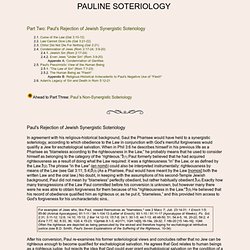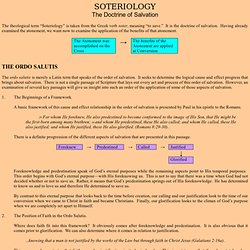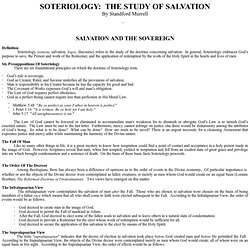

Soteriology. Soteriology; a dogmatic treatise on the redemption : Pohle, Joseph, 1852-1922. Soteriology and Christology. The following was a paper responding to the topic, "What is the relationship between an attempt to portray the salvation Jesus Christ brings to us (soteriology) and an attempt to portray the identity of this bearer of salvation (christology)?

" While this may sound quite boring, if you're familiar with the Arian controversy or the various Jesus movements from The Enlightenment period onward, there are some interesting insights to be gleaned from how we influence how Christ is seen, in addition to how such impacts upon salvation. Contents Introduction This paper will explore the relationship between an attempt to portray the salvation Jesus Christ brings to us (soteriology), and an attempt to portray the identity of this bearer of salvation (christology). Although soteriology and christology have just now been succinctly described, these theological fields of study run more deeply than such words express. Top of Page Soteriology Christology What the Arian Controversy Reveals Concluding Summary. Soteriology (ST104) - Download free content from Dallas Theological Seminary on iTunes. Christian Principles: Soteriology - Calvinism and Arminianism.
Pauline Soteriology. Part Two: Paul's Rejection of Jewish Synergistic Soteriology 2.1.

Curse of the Law (Gal 3:10-12) 2.2. Law Cannot Give Life (Gal 3:21-22) 2.3. 2.4. 2.4.2. Appendix A: Condemnation of Gentiles. SOTERIOLOGY. The Doctrine of Salvation The theological term “Soteriology” is taken from the Greek verb soter, meaning “to save.”

It is the doctrine of salvation. Having already examined the atonement, we want now to examine the application of the benefits of that atonement. The ordo salutis is merely a Latin term that speaks of the order of salvation. It seeks to determine the logical cause and effect progress that brings about salvation. 1. A basic framework of this cause and effect relationship in the order of salvation is presented by Paul in his epistle to the Romans. 29 For whom He foreknew, He also predestined to become conformed to the image of His Son, that He might be the first-born among many brethren; 30 and whom He predestined, these He also called; and whom He called, these He also justified; and whom He justified, these He also glorified.
There is a definite progression of the different aspects of salvation that are presented in this passage. 2. Where does faith fit into this framework? Index Theology Soteriology. Soteriology%20in%20Ephesians. SOTERIOLOGY. By Standford Murrell Definition Soteriology, (soteria, salvation, logos, discourse) refers to the study of the doctrine concerning salvation.

In general, Soteriology embraces God’s purpose to save, the Person and work of the Redeemer, and the application of redemption by the work of the Holy Spirit in the hearts and lives of men. There are six foundational principles on which the doctrine of Soteriology rests. · God’s rule is sovereign. · God as Creator, Ruler, and Saviour underlies all the provisions of salvation. · Man is responsibility to his Creator because he has the capacity for good and bad. · The Covenant of Works expresses God’s will and man’s obligation. · The Law of God requires perfect obedience. · God as a perfect Being cannot require less than perfection in His Moral Law. ¨ Matthew 5:48 "Be ye perfect as your Father in heaven is perfect.
" ¨ 1 Peter 1:16 "It is written: Be ye holy for I am holy. " ¨ John 5:17 "All unrighteousness is sin. " Calvinism Soteriology Topics.